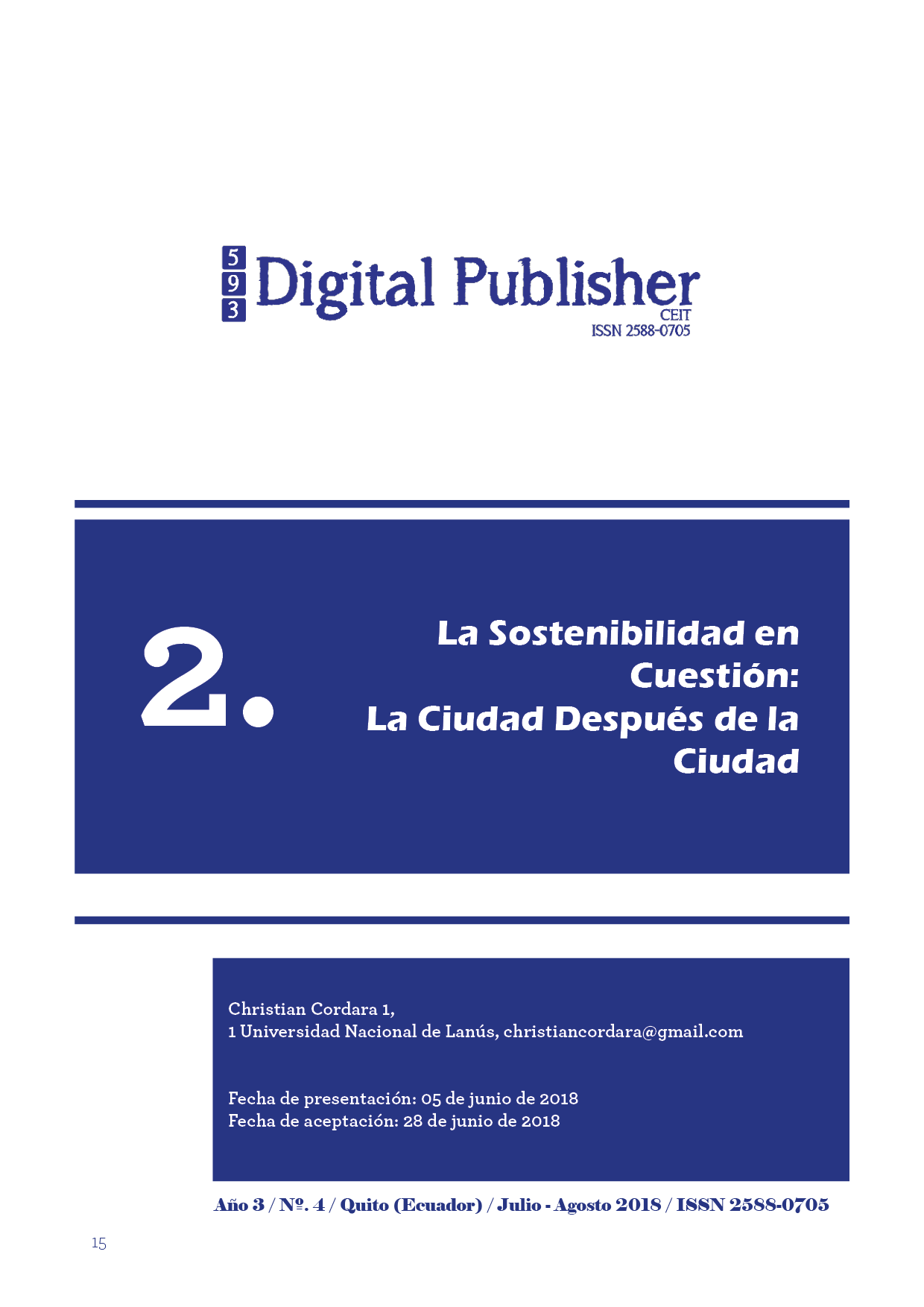La Sostenibilidad en Cuestión: La Ciudad Después de la Ciudad
Main Article Content
Abstract
To tackle sustainability problems from a bioecological perspective, focused on environmental conflicts and the impacts caused on the biosphere and the ecosystems, has been the prevailing approach in the analysis, recommendations and apothegms on the environmental matter during the last 40 years. There’s no doubt this is an important issue.
However, within the framework of the rights of nature, diverse and biased interpretations have been supported about the state of depredation and plunder the Earth has been submitted to during a long period -always depending on the dominant perspective of the hegemonic discursive bloc and the resolution of the struggle for power of that period.
From a human perspective, focused on the socio-environmental conflicts, most considerations about social issues have resulted aloof when trying to stablish the structural causes of the impacts that the production processes and the capitalist development -based on the Leonard’s linear equation: extraction to production to distribution to consumption to disposal- stamped on nature itself.
Hence, it is fundamental to separate what’s accessory from what’s structural. For this, it becomes essential, both methodologically and epistemologically, to tackle the study of the environmental issues through a comprehensive analysis, which implies acknowledging the complex and random nature of this phenomenon.
In summary, focusing on the production processes of urban space can be revealing, given the obvious interphase produced there-in, manifested in the antinomy of growth-sustainability.
The planet is mostly urban; therefore, global sustainability depends on urban sustainability. Exploring this possibility will be the roadmap leading the way across these words.
Downloads
Article Details
1. Derechos de autor
Las obras que se publican en 593 Digital Publisher CEIT están sujetas a los siguientes términos:
1.1. 593 Digital Publisher CEIT, conserva los derechos patrimoniales (copyright) de las obras publicadas, favorece y permite la reutilización de las mismas bajo la licencia Licencia Creative Commons 4.0 de Reconocimiento-NoComercial-CompartirIgual 4.0, por lo cual se pueden copiar, usar, difundir, transmitir y exponer públicamente, siempre que:
1.1.a. Se cite la autoría y fuente original de su publicación (revista, editorial, URL).
1.1.b. No se usen para fines comerciales u onerosos.
1.1.c. Se mencione la existencia y especificaciones de esta licencia de uso.
References
Asamblea Legislativa Plurinacional Boliviana. (2010). Ley 71 de Derechos de la Madre Tierra. Ley. La Paz, Bolivia: Estado Plurinacional de Bolivia.
Azkarraga, J., Max-Neef, M., Fuders, F., & Altuna, L. (2011). La evolución sostenible (II). Apuntes para una salida razonable. Eskoriatza: Lanki.
BID. (2011). Sostenibilidad urbana en América Latina y el Caribe. Washington DC: Banco Interamericano de Desarrollo.
Bozzano, H. (2002). Territorios híbridos de base dialéctica. Reflexiones sobre el objeto de la Geografía. Reflexiones geográficas(10), 147-147.
Castells, M. (1974). Estructrura de clases y política urbana en América Latina. Buenos Aires: Ediciones SIAP.
Federovisky, S. (2012). Los mitos del medio ambiente. Buenos Aires: Capital Intelectual.
Francisco. (2015). Laudato Si. Carta Encíclica. Roma: Tipografía Vaticana.
Kempf, H. (2010). Para salvar el planeta, salir del capitalismo. Buenos Aires: Capital Intelectual.
Malacalza, L. (2003). Ecología y Ambiente. Buenos Aires: Hermes Ediciones.
Martinez-Alier, J. (2005). El ecologismo de los pobres. El ecologista(45), 41-43.
Martinez-Alier, J. (2006). Los conflictos ecológico-distributivos y los indicadores de sustentabilidad. Polis Revista Latinoamericana(13).
Mignaqui, I. (2009). Gestión Ambiental y desarrollo económico-territorial en la cuenca del Río Matanza-Riachuelo. Escenarios y estrategias en debate. Actas 9º EGAL. Montevideo: Universidad de la República.
Mignaqui, I., & Cappuccio, S. (2012). Planificando la Cuenca Matanza Riachuelo: estrategias de ordenamiento territorial y ambiental en debate. I Congreso Latinoamericano de Ecología Urbana. Los Polvorines: Universidad de General Sarmiento.
Mumford, L. (1956). Ciudades para un futuro más sostenible. Recuperado el Febrero de 2016, de http://habitat.aq.upm.es/
Naciones Unidas. (1996). Conferencia de las Naciones Unidas sobre los Asentamientos Humanos (Hábitat II). Estambul, Turquía: ONU.
O`Connor, J. (2001). Causas naturales. Ensayos de marxismo ecológico. México: Siglo XXI.
Pradilla Cobos, E. (1997). Regiones o territorios, totalidad y fragmentos: reflexiones críticas sobre el estado de la teoría regional y urbana. EURE-Revista de estudios urbano regionales, 23(68), 45-55.
Quintana Ramirez, A. (2006). El conflicto socioambiental y estrategias de manejo. Pereira, Colombia.
Santos, M. (2000). La naturaleza del espacio. Barcelona, España: Ariel.
Szajnberg, D., & Cordara, C. (2015). Tensiones, complementariedades y articulación del Ordenamiento Territorial y las Politicas Sectoriales como instrumentos de regulación de patrones de conformación socio-territorial. X Bienal del coloquio de transformaciones territoriales-AUGM (págs. 659-680). Córdoba, Argentina: Universidad Nacional de Córdoba.

